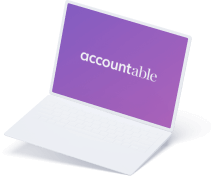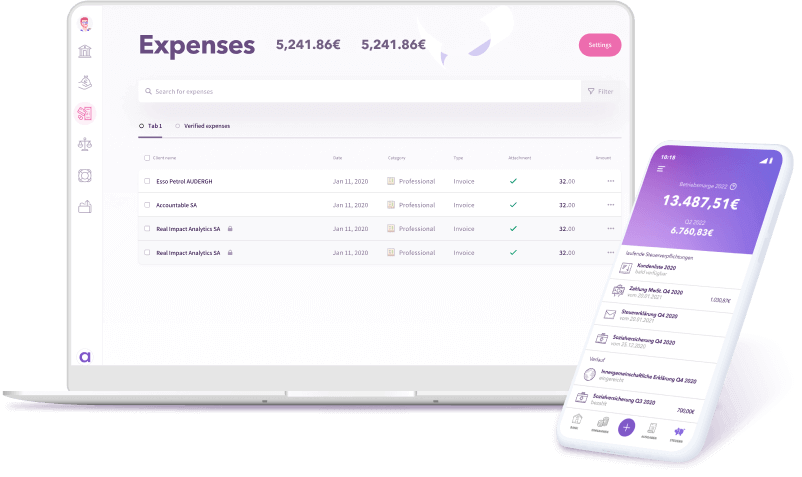
Net income for freelancers
Read in 5 minutes
For employees it’s easy: A quick glance at the pay slip is enough to determine how much net is left from their gross monthly salary. But how do you calculate your net income as a self-employed professional in Germany?
This question is much more difficult to answer. As a freelancer you have to calculate your gross and net income on your own. In this article, we explain you how to do it, which deductions you have to take into account and how to calculate the right hourly and daily rate to be able to live from your self-employment.
Self-employed: How much net remains of the gross?
As a self-employed person, can you tell at a glance how much net money you have available each month to finance your hobbies, leisure activities and well-earned vacations, save something or put something aside for retirement?
You may find this very difficult to calculate, just like many others who earn their money through self-employment. You probably know your revenue, but how much money you actually have left to live on, you probably can’t tell without checking your bank statements first or simply estimating it.
Before you can spend even one euro of your monthly revenue on yourself, your social security costs will be deducted from it. Depending on your social security, wether it’s private health insurance or not, these deductions can vary.
For you as a freelancer in Germany, it’s different from the system for employees: While as a self-employed professional you have to take care of your health and pension insurance and the corresponding contributions yourself, these are already included in the salary of employees.
Depending on the insurance coverage, the costs that you have to cover yourself include:
- Health insurance (private or voluntary public insurance)
- Additional insurance for daily sickness benefits
- Nursing care insurance (Pflegeversicherung)
- Unemployment insurance
- Pension insurance
💡While you are legally obligated to have health insurance in Germany, you are not obligated to have pension insurance. This may sound like an easy way to have more net money available each month as a self-employed person. But you should at least consider your private pension plan, because you cannot fully rely on the state pension.
What also works different for employees are tax deductions. For example the money for income tax is not deducted monthly from your salary, but only when you submit your tax return, you must also reckon with other monthly costs, depending on the industry and activity:
- Rent
- Travel expenses
- Material costs
- Travel expenses
- Telephone costs
- Hotel costs
etc.
Only when you have deducted these costs from your monthly revenue, you know how much net you have left from the gross as a self-employed professional.
Calculation: How much net income is left for self-employment professionals
In order to calculate your net income as a self-employed person, you not only need to know all your figures, but ideally, you should also be familiar with tax issues. The calculation of the net income of self-employed persons is much more complex than for employees, as you can see in the following example.
Let’s assume you have started your own business as a yoga teacher, you are 32 years old, single, have no children and live in Berlin. You are voluntarily insured in the public health insurance and you pay every month into the public pension insurance.
You calculate your profit for the last year using the profit & loss statement (EÜR). This amounts to 30,000 euros gross. You must first deduct your social security contributions such as health, nursing care and pension insurance:
- Your health insurance reduces your taxes and adds up to 18.5% of your income, i.e. 5,550 euros per year or 462 euros per month.
- Your pension insurance is also tax-reducing and amounts to 18.6% of your income, i.e. 5,580 euros per year.
- If you have taken out voluntary unemployment insurance, you can also deduct this from your taxes.
- After deductions, the taxable income amounts to 18,870 euros, on which 1,973 euros in income tax were due in 2021.
- This results in a net income of 16,897 euros per year. That is around 1,400 euros per month.
This means that as a self-employed person, you have 1,400 euros net per month to cover your living expenses. In comparison: If you earned your profit of 30,000 euros as a gross salary of 2,500 euros as an employee, your monthly net income would be around 1,700 euros, which is around 300 euros higher.
In addition, you would also benefit from payed vacations and sick leave. On the other hand, as a self-employed person you can freely arrange your working hours are independent in your decisions and have no boss above you.
What remains net with self-employment? What freelancers earn
In order to be financially successful as a freelancer, i.e. to have enough net income left over from your self-employment, you should not sell yourself below your value.
The income of freelancers varies greatly anyway, depending on the industry, the respective activity and also by federal state: While the average monthly net income does not exceed 5,000 euros in any of the new federal states, it is significantly higher in the old ones. While you can earn up to 7,900 euros per month as a freelancer in Saarland, it’s still 6,922 euros in Hamburg.
This kind of income is primarily earned by highly specialized freelancers. SAP experts are among the absolute top earners, with hourly rates rising again by 11 euros in 2022. There are also major differences in hourly rates. These range from 76 to 102 euros. The top and bottom performers in a Germany-wide comparison are the following federal states:
- Baden-Württemberg: 101 Euro
- Hamburg: 102 Euro
- Saarland: 102 Euro
- Mecklenburg-Vorpommern: 88 Euro
- Thüringen: 76 Euro
- Bremen 67 Euro
Therefore, you should know exactly how to calculate a reasonable hourly wage.
Calculate your hourly rate: This will leave you with more net as a freelancer
Determining the right hourly rate is a challenge for many freelancers. Often, hourly rates of 80 to 120 euros seem much too high when compared to the hourly wage of an employee in a similar position.
However, you should not draw this comparison when calculating your hourly rate, as it does not make sense: While employees receive a fixed salary including vacation and sick pay every month, you as a freelancer also have to take into account periods without revenue when the order situation is bad. In addition, unlike employees, you have to pay all your insurances yourself.
As a freelancer, you need to think like an entrepreneur in order to make a profit. Therefore, you should be confident in your qualifications and confident with your clients when negotiating your hourly rate. You can calculate your hourly rate relatively easily in two steps. In the first step you calculate your working time and in the second step your hourly rate:
Calculate your working time
First, you subtract the weekends and holidays from the 365 days in a year. From the remaining 250 days, you must subtract your vacation days, of which you should allow yourself at least 20. In addition, you should assume an average of 14 sick days, which you should also deduct.
This leaves 216 working days per year or 18 working days per month. However, you cannot assume that you will work from morning to night on these days or that you will always have enough orders. So you should plan about two-thirds of the time for billable working hours. The rest of the time you plan for acquisition and organizational work.
Calculation of the hourly rate
Now add up all your private (gross) and business costs (net) that have to be covered by your fee: Insurances, living expenses, taxes, internet, etc. and put them together with your working hours into the following formula:
- Cost / working time = hourly rate
Let’s assume that your total monthly costs are 6,000 euros and you work about 90 hours a month. Then your hourly rate would have to be at least 66 euros net to avoid making a loss.
However, since you want to make a profit and also have to provide for bad times, you should add a profit markup of at least 10 percent to your hourly rate. If you do not make use of the Kleinunternehmerregelung (small business regulation), you have to add VAT at the end:
- 6,000 EUR (net running costs + gross private costs) / 90 hours per month = 66.67 EUR net
- 66.67 EUR net + 6.67 EUR profit mark-up (10 percent) = 73.34 EUR net
- 73.34 EUR net + sales tax (19 percent) = 87.27 EUR (gross amount)
💡Tip from Accountable: Make your life easier and use a tax software like Accountable. The app and Web version shows you in real-time, how much money you will have to set aside for taxes and how much you can spend for your own private expenses.
Did you find what you were looking for?
Happy to hear!
Stay in the know! Leave your email to get notified about updates and our latest tips for freelancers like you.
We’re sorry to hear that.
Can you specify why this article wasn’t helpful for you?
Thank you for your response. 💜
We value your feedback and will use it to optimise our content.













